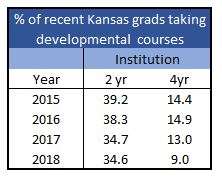There’s good news and bad news regarding the number of recent high school grads who enter Kansas colleges and universities and find themselves having to take a developmental (remediation) course. The good news is that the percentage of those students seems to be ticking downward. The bad news is that still about one-quarter of all recent grads entering post-secondary education are required to take a remedial math and/or reading/English class as a prerequisite.
Data from the Kansas Board of Regents shows that a disproportionate share of students required to take  developmental courses are in the state’s 19 community colleges – 35% as opposed to only 9% of students entering one of the state universities.
developmental courses are in the state’s 19 community colleges – 35% as opposed to only 9% of students entering one of the state universities.
How do students get assigned a developmental course? Each college/university sets its own specific requirements that follow general guidelines provided by the Kansas Board of Regents. However, for most students it starts with the ACT. If a student’s ACT score falls below a given threshold, he or she is required to take the ACCUPLACER placement test. Performance on that assessment is used to determine if remediation is required.
Despite the apparent improvement, the reality that a fourth of all newly graduated Kansas students require college-level remediation should be of great concern. There are several reasons why.
-> It is expensive. A recent study released by Center for American Progress, a left-leaning policy think tank, shows that in 2014 remedial classes cost Kansas college students an additional $16.6 million in out-of-pocket expenses.
-> It disproportionately impacts low-income and minority students. Although Kansas does not report such numbers, a National Council of State Legislatures paper claims those students are much more likely to need remediation than their white and not-low-income counterparts. Despite the absence of data, it is highly likely that the same is true in Kansas given the significant income-based achievement gaps.
-> Studies have shown that students who need remediation are much less likely to graduate than those who do not.
Those concerns notwithstanding, there are actions that can be done in Kansas to reduce the number of recent grads who need postsecondary remediation. Much of that onus is on Kansas secondary schools. High schools have ample data to determine who needs remediation prior to graduation. (That statement begs the question of whether a student who needs remediation should graduate – but that’s a discussion for a different forum.) Coming into high school students have state assessment scores from eighth grade, they are tested again in tenth grade and most students take the ACT prior to their senior year. This gives high schools at least a full year to analyze test results and provide remediation to those who need it. As Center for American Progress states “the need for remedial education for recent high school graduates can be eliminated by ensuring that high schools do a better job preparing students for college and careers.”
Also, better data is needed to fully understand the scope of the problem in Kansas. The Board of Regents only reports the overall percentage of students who take developmental courses and not their demographics or success rate. A recent publication from Complete College America paints a rather dismal success rate for students in neighboring states who need remediation. The average graduation rates of Oklahoma, Colorado and Missouri remedial students is about 10% for 2-year institutions and about 25% for 4-year colleges and universities. (Kansas was one of a handful of states not included in the study.)
Clearly, a light needs to be shined on this problem. As entrenched organizations tout Kansas as being a top-ten state in student achievement, a large portion of those pursuing post-secondary education are ill-equipped coming out of high school. There is no excuse for ignoring the needs of those students. Using the additional money provided in that last legislative session would be a good place to start.




